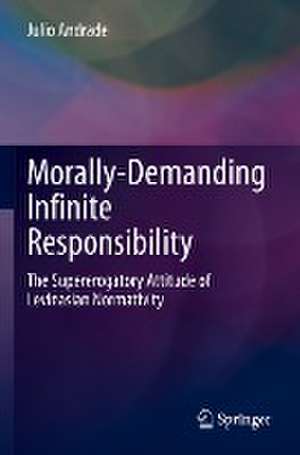Morally-Demanding Infinite Responsibility: The Supererogatory Attitude of Levinasian Normativity
Autor Julio Andradeen Limba Engleză Paperback – 18 mar 2022
Supererogatory actions are praiseworthy actions that go ‘beyond duty’, and yet are not blameworthy when not performed. In responding to this paradox, moral philosophy either brackets or attempts a reductionism of supererogation. Supererogation is epitomised in the paradigmatic figures of the saint and hero. Yet, most would agree that emulating these figures is too morally demanding. We rightly ask: where does moral obligation end? Is it even possible, or desirable to demarcate such a boundary? Besides the important theoretical issues these questions raise, they also speak to practical ethical dilemmas in the contemporary milieu, as they concern the global wealthy’s responsibility to the poor and the challenges of development aid work.
| Toate formatele și edițiile | Preț | Express |
|---|---|---|
| Paperback (1) | 723.93 lei 6-8 săpt. | |
| Springer International Publishing – 18 mar 2022 | 723.93 lei 6-8 săpt. | |
| Hardback (1) | 729.36 lei 6-8 săpt. | |
| Springer International Publishing – 17 mar 2021 | 729.36 lei 6-8 săpt. |
Preț: 723.93 lei
Preț vechi: 882.85 lei
-18% Nou
Puncte Express: 1086
Preț estimativ în valută:
138.57€ • 150.57$ • 116.47£
138.57€ • 150.57$ • 116.47£
Carte tipărită la comandă
Livrare economică 21 aprilie-05 mai
Preluare comenzi: 021 569.72.76
Specificații
ISBN-13: 9783030616328
ISBN-10: 3030616320
Ilustrații: XII, 204 p. 1 illus.
Dimensiuni: 155 x 235 mm
Greutate: 0.34 kg
Ediția:1st ed. 2021
Editura: Springer International Publishing
Colecția Springer
Locul publicării:Cham, Switzerland
ISBN-10: 3030616320
Ilustrații: XII, 204 p. 1 illus.
Dimensiuni: 155 x 235 mm
Greutate: 0.34 kg
Ediția:1st ed. 2021
Editura: Springer International Publishing
Colecția Springer
Locul publicării:Cham, Switzerland
Cuprins
Introduction.- I. Mapping supererogation.- II. Assimilating supererogation.- III. Proximity and moral demandingness.- IV. Impartialism, autonomy and supererogation.- V. Morally demanding infinite responsibility: an analytic-continental segue.- VI. Ethics as first philosophy.- VII. Constructing a Levinasian normativity (without norms).- VIII. Levinasian normativity is supererogatory.- IX. The analytic/continental divide redux: continuities and departures.- Conclusion.
Notă biografică
After working in the hospitality industry for fifteen years, Julio Andrade reinvented himself as an ethicist. His research interests include whistleblowing (with work published in Springer’s Journal of Business Ethics) and developing Levinasian ethics to engage with applied ethics issues in environmental ethics, information ethics and critical race theory. He is the current secretary-general of BEN-Africa (The business ethics network of Africa) and is also a certified ethics officer.
Textul de pe ultima copertă
This book presents a conceptual mapping of supererogation in the analytic moral philosophical tradition. It first asks whether supererogation can be conceptualised in the absence of obligation or duty and then makes the case that it can be. It does so by enlisting the resources of the continental tradition, specifically using the work of Emmanuel Levinas and his notion of infinite responsibility. In so doing the book contributes to the ongoing efforts to create a common ethical terminology between the analytic and continental traditions within moral philosophy.
Supererogatory actions are praiseworthy actions that go ‘beyond duty’, and yet are not blameworthy when not performed. In responding to this paradox, moral philosophy either brackets or attempts a reductionism of supererogation. Supererogation is epitomised in the paradigmatic figures of the saint and hero. Yet, most would agree that emulating these figures is too morally demanding. We rightly ask: where does moral obligation end? Is it even possible, or desirable to demarcate such a boundary? Besides the important theoretical issues these questions raise, they also speak to practical ethical dilemmas in the contemporary milieu, as they concern the global wealthy’s responsibility to the poor and the challenges of development aid work.
Caracteristici
Addresses the neglect of the study of supererogation within the continental philosophical tradition First to develop Levinasian politics by enlisting work from Philosophical or critical Complexity Brings the work of Peter Singer and Emmanuel Levinas into conversation Contributes to the ongoing efforts to create a common ethical terminology between the analytic and continental traditions within moral philosophy
